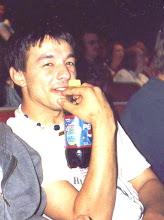Community leaders from across state meet to seek meth solutions (Montana)
By KIM SKORNOGOSKI
Tribune Staff Writer
HELENA — Meth destroys lives. It hurts families. It leads to crime. And it drains community and state resources.
With those facts in mind, more than 240 elected officials, treatment professionals, community leaders and former addicts are in Helena to lay out statewide solutions to the problem. The conference opened Monday and continues today.
"Over the next two days, I believe we have the opportunity to set a course that will make a substantial difference — both in people's lives and to Montana's future," Attorney General Mike McGrath said.
He kicked off the conference, sponsored by Montana State University's Burton K. Wheeler Center, with a challenge to share ideas that work and tell government what laws and resources are needed to expand those ideas.
"We've been talking about it for five years," said Ron Clem, a former police officer whose daughter got hooked on meth. "It's time we got off the pot."
Carren Clem began using meth as a teenager in 2000 and was soon living on the streets, doing whatever it took to get more meth. To get clean, her parents paid $130,000 to send her to an 18-month program in Jamaica.
"People ask me 'why not go to treatment here in Montana?' because Montana doesn't have any," Clem said.
Thirty days into her treatment program — the length of some of the longest residential treatment programs in the state — she was calling her friends and dealers trying to get meth.
Montana has three residential meth treatment programs for women in Billings, Missoula and Great Falls. All have long waiting lists to get in and scrape funds together each year to keep the programs going.
In addition to more and longer treatment, speakers suggested expanding after-school programs. Rather than filling the hours between 3 and 6 p.m. with drinking or drugs, kids could be drawing, learning how to design computer graphics, fishing or hiking.
Kirk Astroth, director of the Montana 4-H Center for Youth Development, noted that 16 Montana counties don't have after-school programs, and roughly one in seven students participate in current programs.
He called on adults to invite students to the table, both in community task forces and through a "children's cabinet" to be consulted with about legislation and other government issues affecting children.
"We would not only address the meth issue, but we'd give our young people a chance to succeed in our state," he said.
Rather than create new programs, the state needs to fund current ones that work.
"I have watched these prevention programs spend 60 percent of their time searching for funds instead of executing programs," said Kris Dunn, head of the Great Falls Weed and Seed program.
Kathryn Woodward, a meth prevention specialist with the Yellowstone City-County Health Department, called on government and nonprofit programs to document results, good and bad. She studied 152 Billings addicts for UCLA, tracking them for three years.
The study was one of the country's longest. But it still doesn't answer what long-term health problems addicts have and what happens to children of addicts as they grow into adults.
Several speakers talked about programs they pushed through the Legislature that later were rejected because elected officials didn't want to back a tax hike. One audience member suggested taking the issue to the public, saying that like the tobacco tax, voters will support an alcohol tax to fund addiction treatment.
With the Montana Meth Project putting the topic on the table, parents need to educate themselves about meth so they can thoroughly answer questions. Adults need to realize that telling kids to reject meth rings hollow if they endorse drinking or turn a blind eye to other drugs like marijuana, said Casey Molloy, the Safe and Drug Free Schools coordinator for Helena.
There kids spearheaded a campaign that included flyers in grocery bags, radio ads and billboards. High school seniors' parents were invited to sign contracts agreeing not to host or encourage drinking parties. Those who signed were congratulated with their names in the newspaper.
"We're at the point of no longer saying we have a problem, but now saying we have solutions," said Executive Director of the Montana Meth Project Peg Shea.
Reach Tribune Staff Writer Kim Skornogoski at 791-6574, (800) 438-6600 or kskornog@greatfal.gannett.com.
http://www.greatfallstribune.com/apps/pbcs.dll/article?AID=/20060516/NEWS01/605160301/1002


0 Comments:
Post a Comment
Subscribe to Post Comments [Atom]
<< Home